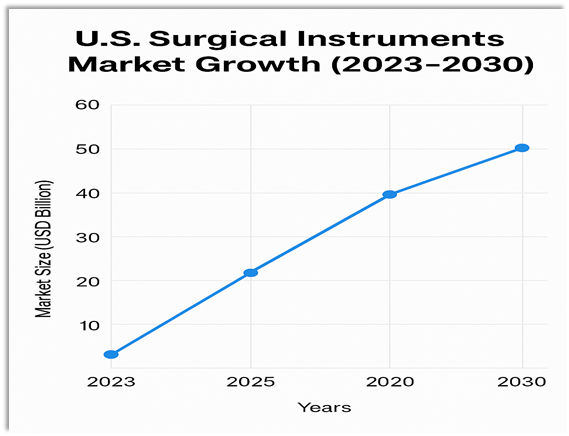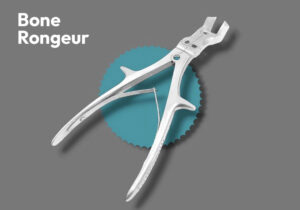The realm of surgery is one in which absolute precision is the keystone. One of the most significant factors in the success of any surgical procedure is the quality and suitability of the tools utilized. General surgical instruments are at the core of every operating room and play a crucial role in ensuring patient safety, procedural efficiency, and optimal outcomes.
In this blog post, we will discover in detail the general surgical tools and instruments widely used in precision across the world.
Why the Right Surgical Instruments Matter
Using improper or low-quality surgical tools can have catastrophic effects. Leading to increased infection rates and longer patient recovery times, the consequences of deteriorating patient health are worsening. Apart from that, instrument malfunctions are also a significant cause of extended operating periods for medical staff.
Surgical equipment is a critical aspect of every surgical room, so leading companies are devoted to high-quality and reliable equipment that complies with strict surgical instruments quality standards. These tools are designed to enhance surgical efficiency through precise surgical techniques, ultimately providing the best possible outcomes for patients.
Comprehensive Overview of Surgical Instrument Types and Uses
| Instrument Category | Common Tools | Usage Summary |
| Cutting & Dissecting | Scalpel, Scissors | To cut tissue or dissect layers cleanly |
| Grasping & Holding | Forceps, Needle Holder | To hold or manipulate tissues/objects |
| Clamping & Occluding | Hemostats, Clamps | To stop bleeding and isolate structures |
| Retracting & Exposing | Retractors (hand-held/self-retaining) | To increase visibility during surgery |
| Suturing & Stapling | Needle, Stapler | To close surgical wounds |
| Suctioning & Aspirating | Suction tips, Tubes | To keep the surgical site clear of fluids |
| Dilating & Probing | Dilators, Probes | To explore or widen anatomical pathways |
Cutting & Dissecting
The cutting and dissecting general instruments for surgery are those elements that are indispensable in almost every operation. Common surgical tools explained: these include:
- Scalpels: These instruments come in many different forms, such as #10, #11, and #15, and are utilized in the cutting of both major and minor incisions. The choice of the blade depends on the nature of the procedure.
- Scissors: In surgery, there are different types of scissors used for different purposes. Mayo scissors are used for heavy cutting, Metzenbaum scissors for delicate tissue dissection, and tenotomy scissors for fine, precise cuts.
Grasping & Holding
These tools function in the manipulation of tissue and the management of sutures.
- Forceps: Carrying thumb forceps, which have either smooth or serrated tips, these instruments are used in core procedures to grip and keep tissue in the right position.
- Needle Holders & Hemostats: These tools are non-negotiable for secure suture handling and bleeding control during surgery.
Retractors & Suction Devices
Retractors and suction devices are tools that are indispensable for having an unobstructed surgical view:
- Retractors: These are available both in handheld and the type that retains itself. Retractors just separate tissue to enable the surgical team a better look at the site to operate on.
- Suction Tools: These gizmos play a major role in the elimination of blood and fluids. Thus, a clear vision of the surgical area is assured.
Surgical Tools
General instruments used in surgery and some procedures are not complete without special machines:
- Rongeurs: They are good for orthopedic and neurosurgery tasks when one needs to remove a small piece of bone.
- Bone Saw: Indispensable for procedures in which we need to cut bones.
- Speculum: Used for gynecological and ENT examinations.
- Trocar: As a main tool in minimally invasive surgeries, this one shouldn’t be missing.
Choosing Quality Instruments for Clinical Excellence
The proper selection of surgical instruments is the key to the safety of medical equipment and successful surgeries, as well. The following major factors are crucial:
- Material: The most preferred option is high-grade stainless steel due to its strength, corrosion resistance, and easy sterilization.
- Reusable vs. Single-use: While the initial cost of reusable instruments is usually much lower, their long-term sustainability and reusability are hard to deny, while single-use devices eliminate the risk of infection from other patients.
- Certifications: Always check for instruments that have been certified by ISO, CE, and FDA, as these certifications show that the instruments have quality and safety standards as well as the required reliability.
The importance of Handling, Maintenance & Sterilization
Proper care and handling of surgical instruments are very important to their durability and preservation of good performance, which requires the following key aspects to be considered:
- Proper Handling Techniques: The Surgical team should be prepared and qualified in the proper handling of the instruments in order to avoid any damage to the device as well as guarantee the safety of the operator. This is executed by instruments only being used for the proper purposes and bearing no extra force.
- Sterilization Protocols: Correct sterilization is the key to the prevention of infections. Autoclaving is the most suitable method for multi-use instruments as well as disposable instruments, which are designed so that they can only be used once; hence, the risk of cross-contamination is eliminated.
- Preventing Corrosion: In order to make the instruments last longer, they should be cleaned and dried off immediately after use. Another important thing is always inspecting the substrate video for tears and unhealthy tissue shedding.

Buyer’s Guide: What to Ask Your Supplier
During the procurement of surgical instruments, keep in mind that you ought to ask the right questions:
- Quality Check Questions: You should find out the quality of materials used, the type of finish, and any warranty before you sign the agreement. You also need to ask questions regarding quality control and certificates.
- Purchase Options: Surgical instruments used to hold or grasp items are Consider whether buying individual pieces of the instrument or sets of the instrument is cheaper for you.
- Support Services: Inquire into training, parts supply, and aftercare services. A supply company that is good, generally, should provide a range of these support services.
The Advantage of Quality Surgical Instruments
Investing in high-quality surgical instruments provides a lot of advantages:
- Improved precision during surgeries
- Enhanced patient outcomes
- Decreased instrument failures
- Easier cost management in the long run
Essential surgical instruments for hospitals, with trustworthy and quality instruments supplied by dependable companies, ensure healthcare professionals have the support and the technology they require to have the right tools for treatment.
Conclusion
The importance of high-quality general surgical instruments alongside the technology in health care is highly essential. Such instruments not only provide a precise platform for surgeries but also ensure the protection of the patients and efficiency of the systems. Having an in-depth understanding of surgical item names and tools is important.
Wrangler Surgical Instruments is the sole exporter of surgical items online. For more, visit our website to explore the required general surgical instruments list.
FAQs
1. What are the must-haves for any surgical items business?
Among other instruments, we need scalpels, forceps, scissors, retractors, and needle holders. The exact set of necessary supplies can vary according to the type of surgeries being organized.
2. How often should surgical items manufacturers be replaced?
The frequency of replacement is influenced by the extent of usage, care, and the quality of the instruments. However, the usual way is to follow the regular tinge of the high-quality ones by correct maintenance, but still, several years of efficient usage should be considered.
3. What’s the benefit of upgrading to premium steel tools?
The key feature of the signature steel tools is their robustness, fine point accuracy, and corrosion resistance. They are usually characterized as giving surgeons a better feel and resisting more cycles of sterilization.
4. Are single-use instruments more hygienic?
On the one side, for the single-use instruments, cross-contamination is a thing of the past because the instruments are just thrown away after a single purpose, but then again, they produce a high volume of waste.
5. How to know about the instrument surgical items list?
Firstly, look for suppliers with valid certifications, a good record in the industry, and quality assurance. Require that the suppliers send some references and sample products too, whenever choices are available in quality surgical instruments for sale.




